Owning a luxury mechanical watch goes beyond mere time-telling; it's about making a statement, it's about holding a symbol of history, style, and skilled craftsmanship on your wrist. But such an exquisite timepiece also demands meticulous care and attention. Indeed, your luxury mechanical watch can outlive you and become a cherished heirloom if maintained properly.
This article unfolds the secrets of how to care for your high-end mechanical watch, ensuring it retains its charm and flawless function for generations to come – because your watch isn’t just about luxury, it's about timeless legacy.
Don't Forget to Clean Your Watch

One of the key aspects of maintaining your mechanical watch is ensuring regular cleanups. Rotate this task into your routine by lightly wiping down the band and the case with a soft, dry microfiber cloth to keep dust, grime or perspiration at bay. About every couple of months, consider giving your timepiece a gentle bath. Lightly soak your watch in lukewarm water with a mild cleaning solution, using a soft brush to clean and a soft microfiber cloth to dry off.
However, ensure to do this if your watch is waterproof and always check your manufacturer's instructions before applying water lavishly. Try to make it a habit to give a quick wipe down to your watch after every use to remove any residue of sweat or dust particles which might have gathered throughout the day. This can significantly increase your watch's lifespan and luster.
However, remember that not all watches are created equal. Certain watches, such as those with leather straps, require special attention. The leather is a naturally porous material that can soak up oils, sweat, and other forms of moisture, all of which can lead to premature aging. Instead of using water, clean leather straps with a specifically designed leather conditioner to keep it looking fresh and increase its longevity.
Practice this regular care and you'll note the longevity of your timepiece, keeping it ticking accurately and looking as good as new all-year-round.
Importance of Regular Service
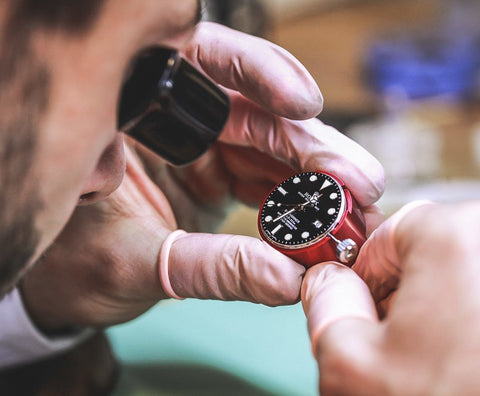
Image Credit: A Blog To Watch
Much like your treasured automobile, your luxury mechanical watch also deserves a regular 'tune-up'. Ensure to book it for professional servicing every 2 to 3 years, as a standard measure. The inner workings of a mechanical watch are intricate and precision-engineered; routine maintenance ensures that every cog and wheel functions in harmony.
The process of servicing involves delicate tasks that stretch beyond simple cleaning and oiling. A professional watchmaker painstakingly opens up your timepiece to not just clean away accumulated dust or grime, but also to have a thorough look at all its constituent parts. Over time, even sturdy materials can show signs of wear and tear. Regular checking helps spot such issues before they escalate into bigger, potentially irreparable problems.
The final step in the process is a rigorous testing phase, wherein the watch's accuracy and performance are placed under scrutiny. This includes testing for water resistance (if applicable), power reserve, and other technical specifications of your timepiece.
Regular servicing not only aids in maintaining the longevity of your watch but also keeps your investment secure. Just remember, when it comes to luxury mechanical watches, prevention is indeed better than cure.
Avoid Magnets

Image Credit: Worn and Wound
It's an unfortunate yet relatively lesser-known fact that magnets can damage the timekeeping ability of your mechanical watch. The heart of a mechanical watch is its escapement mechanism, which is often made from metallic materials that are susceptible to magnetism. If exposed to a magnetic field, the metallic parts within the watch can become magnetized, disturbing its time keeping precision.
What's the impact? A watch exposed to magnetism may invariably begin to run either too fast or too slow. This is because the magnetized components disrupt the balance wheel's oscillations - the key player in ensuring precise timekeeping - leading to inaccurate time display.
Being mindful of where you place your watch when not in use can prevent such incidents. Try to avoid leaving them on surfaces that might be magnetized or near everyday objects that create a magnetic field. This could include laptops, tablets, speakers, or even your refrigerator.
If your watch has been magnetized, it's thankfully not a permanent issue and can often be fixed with a demagnetizing process carried out by a professional watchmaker. However, preserving the accuracy of your timepiece is very important, so it's best to sidestep this issue by keeping your precious timepiece away from magnets at all times.
Understanding Your Watch’s Water Resistance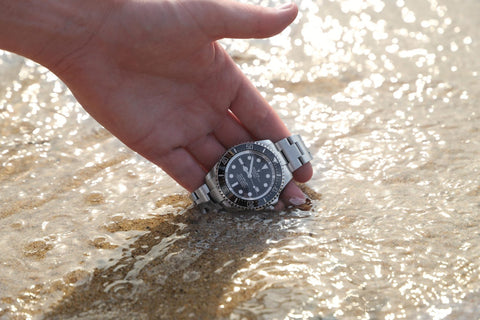
If the watch is resistant to water, it means it can handle water pressure up to a certain depth. However, differing water pressures associated with different activities, like hand washing, swimming, or diving, can sometimes exceed these limits. Always check the manufacturer's instructions to see what level of water exposure your watch can safely handle.
For watches that aren't water resistant, it's best to avoid even a few drops of water. A splash of water while washing hands or a bit of rain can seep into the watch, damaging the internal mechanics. If your watch band is made of leather, water exposure can weaken and deteriorate it over time, ruining its overall look and comfort.
So, the rule of thumb is, unless your watch is marked as water-resistant and you’re aware of its level of protection, it's wise to keep it dry. Being aware of your watch's water resistance level can play a big role in maintaining your watch's functionality and aesthetics over time.
Protect Your Watch Crystal
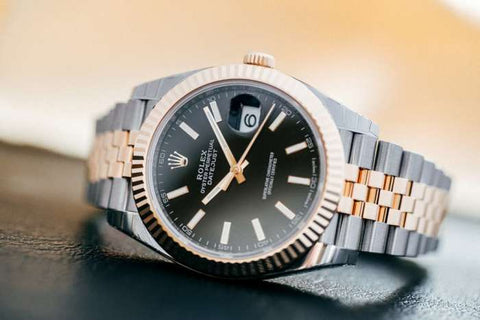
Ensure to avoid hard knocks or impacts against walls, doors, or any potentially damaging surfaces, that could leave undesirable scratches on the watch crystal. While some minor scratches might be unavoidable in the long run, more severe or deep scratches can affect the watch’s overall appearance and sometimes even its functionality.
Consider investing in a watch crystal protector if the model of your watch offers one. A watch crystal protector acts as a shield, safeguarding the surface of your watch from scratches when you accidentally hit it against an object. It’s similar to a screen protector for your smartphone, providing an additional layer of defense against potential damage.
In addition, try to establish a habit of placing your watch with the face upwards when not in use to avoid direct contact and potential scratches to the crystal. It's the little habits that can prolong the life and beauty of your watch crystal, maintaining the overall appeal of your cherished timepiece.
Use A Watch Box for Safekeeping

Image Credit: The Slender Wrist
The box your watch comes in isn't just for looks, it serves as an ideal storage place for your luxury mechanical watch. If you have a collection of luxury mechanical watches, a huge watch box offers a snug and safe fit and is designed to protect your precious timepiece when it's not being worn.
Most accidents involving watches occur when they aren't being worn. These unexpected incidents can easily lead to falls, damaging your watch or leaving unwanted scratches. This can be avoided by always storing your watch in its protective box or in a shockproof protective cases and watch rolls which you can bring whenever you go. This helps you travel with peace of mind knowing your watches are secure.

Never leave your watch lying on its side or, even worse, on the crystal side as it can scratch or damage the glass and the watch case. It's equally important to not just leave your watch anywhere where it might be knocked over or exposed to risky elements, like water and dust.
Keeping your watch box, durable protective cases or watch rolls as your go-to storage option can be beneficial, providing a safe haven for your timepiece. They offers peace of mind, ensuring the longevity and preservation of the aesthetics and function of your precious investment. So, after you take your watch off, don't simply set it down - tuck it safely back into its box, protective case, or roll.
Limit Extended Sunlight Exposure
Continuous and prolonged direct exposure to sunlight can cause the color on your watch's face or strap to fade over time. This not only impacts the visual appeal but can also diminish its value, particularly for luxury watches where every detail matters.
Not just the appearance, sunlight can also have implications on your watch's performance. Sunlight generates heat and, like most electronic devices, watches don't perform their best when exposed to high temperatures. Some watches, particularly quartz watches, can see an impact on battery life if left in the hot sun for extended periods.
While the occasional day out in the sun won't severely harm your watch, if you're planning to spend a long day in the sun, it might be best to keep your prized timepiece safely stored away. Always remember, a little shade goes a long way when it comes to maintaining your watch's beauty and performance.
Avoid Chemical Contact
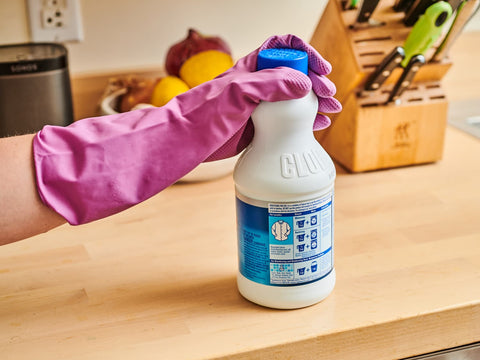
Image Credit: Apartment Theraphy
Just like magnets and water, various chemicals found in daily products can also be damaging to your watch. Substances like cleaning solutions, fragrant oils, perfumes, and even hand sanitizers can potentially harm both the case and the strap of your watch.
When these substances accidentally spill or spray onto your watch, they can cause the color to fade, particularly on the watch band, or lead to the corrosion of metal parts. In the case of leather bands, perfumes or colognes can cause the leather to dry out, leading to cracks or damage over time.
To avoid such incidents, ensure your watch is entirely dry before putting it on. Better yet, consider making your watch the last thing you wear as you prepare for your day. By doing so, you significantly reduce the chance of any spillages or contact with harmful substances.
When cleaning your watch, avoid using strong detergents or chemicals, which can be harsh on your wristwatch and might cause undesired damage. Instead, stick to mild, soapy cleaning solution (for water resistant watches) or a dry, microfiber cloth for occasional wipe downs.
By keeping these pointers in mind, you can protect your watch and ensure it maintains its charm and functioning in the long run.
Resist the Urge to Open Your Watch
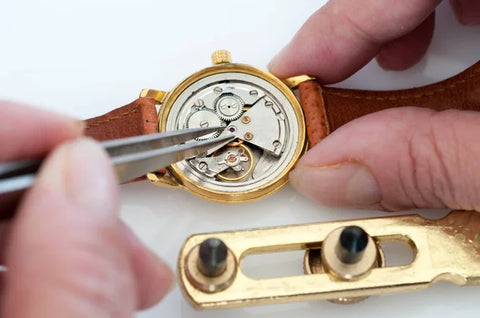
While it may be intriguing to explore the complex machinery inside your luxury mechanical watch, it's strongly recommended not to open your watch by yourself. The interior of a watch is a carefully crafted arena full of tiny, precise parts. Opening your watch can expose these parts to dust, humidity, and other foreign particles. Even a tiny speck of dust can disrupt the smooth functioning of your watch, causing potential damage to its movement.
Furthermore, without the proper tools and knowledge, it’s easy to inadvertently cause more harm than good. These timepieces are incredibly intricate, and one wrong move could lead to damaging the mechanism, the case back, or even losing some of the tiny parts.
For the health and longevity of your watch, it's best to leave the opening and closing of the case back to professionals - a trained watchmaker or an authorized service provider. They have the tools and experience to handle such tasks without causing harm to your valuable timepiece.
Remember, the ‘do-it-yourself' approach may not be the suitable path when it comes to luxury mechanical watches. Always consult a professional for any internal issues or servicing requirements to ensure your watch remains in top shape.
Be Knowledgeable of Your Watch

Knowing your watch's specifics is just as important as the general care steps. Every watch is unique with different capabilities and needs. It’s important to understand these details to accurately care for your timepiece.
This is where the watch's manual or user guide becomes your best friend. The manual provides care instructions tailored specifically for your watch. It includes details about your watch's resistance to water and scratches and other unique features.
The manual might also offer guidance on how often your specific watch model needs servicing, or how to clean specific materials like leather or precious metals that might be part of the watch's construction.
If your watch has special features like a chronograph, perpetual calendar, moonphase display, or other complications, the manual will also explain how to use these correctly and care for them over time.
Understanding your watch, its features, capacity and limitations helps prevent accidental damage and ensures you’re getting the most out of your timepiece. Using this knowledge paired with the general care steps ensures your watch maintains its optimal condition and performance for years to come. Remember - when in doubt, always consult your watch manual.
Final Thoughts
Investing in luxury mechanical watches isn't solely about owning a time-keeping device; it’s also about appreciating the intricate artistry and sophistication that comes with it. These timepieces are products of meticulous craftsmanship, built to last for generations with the right care. Following the tips outlined above, from regular cleaning to professional servicing, avoiding magnets, and respecting water resistance, will all contribute to maintaining the longevity and allure of your timepiece.Remember, a well-maintained watch isn't just an elegant accessory - it's a storytelling piece, a reflection of a person's taste, style, and the respect they have for timeless craftmanship and innovation.


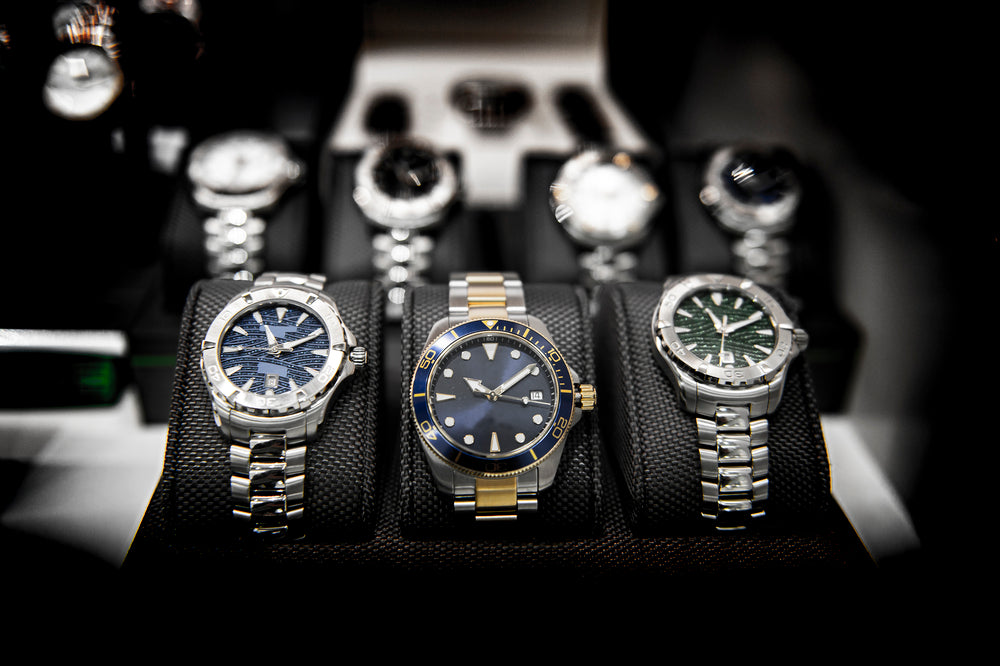
Share:
Top 5 Best Rolexes for Investment